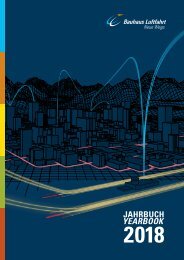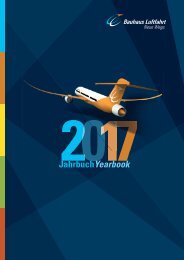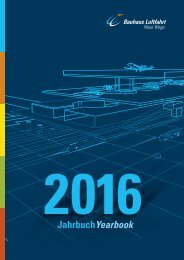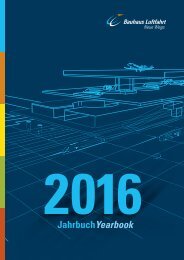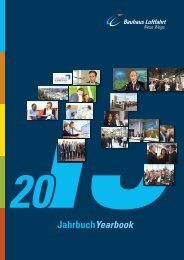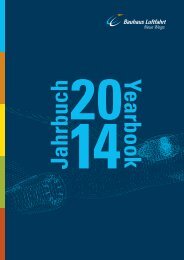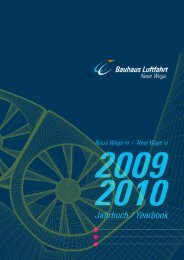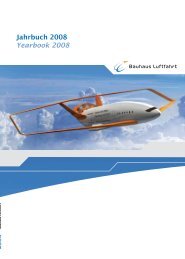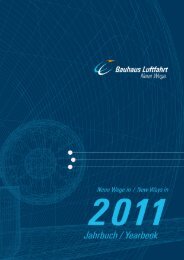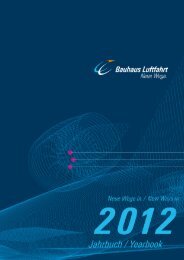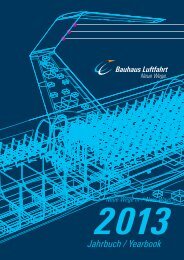Bauhaus Luftfahrt Jahrbuch 2019
- No tags were found...
Create successful ePaper yourself
Turn your PDF publications into a flip-book with our unique Google optimized e-Paper software.
42 alternative fuels
Nebenprodukte verbessern
die Ökobilanz
von Algenkraftstoffen
By-products can Boost
the Greenhouse Gas
Balance of Algae Fuel
Im Verbundprojekt Alpines AlgenKerosin (AAK)
erforschten die Technische Universität München
und das Bauhaus Luftfahrt drei Jahre lang neue
Wege, um nachhaltige Kraftstoffe aus Mikroalgen
herzustellen. Das Projekt fand 2019 seinen
Abschluss. Im Fokus stand die Erprobung neuer
Schlüsseltechnologien: (i) Züchtung eines Algenstammes
mit gesteigertem Lipidgehalt zur Erhöhung
der Kraftstoffausbeute, (ii) Einsatz neuartiger
Dünnfilmreaktoren für höhere Kulturzelldichten
und geringeren Flächenbedarf, (iii) Einsatz von
Enzymen für einen energiesparenden Zellaufschluss,
(iv) Gewinnung von Zellproteinen als wertvolles
Nebenprodukt sowie (v) Verringerung des Prozessenergiebedarfs
der Kraftstoffsynthese durch den
Einsatz eines neuartigen Niedertemperaturkatalysators.
Bei der ökologischen Bewertung dieser neuen
Technologien durch das Bauhaus Luftfahrt ergab
sich ein zweigeteiltes Bild: Während die Konversion
mithilfe des Niedertemperaturkatalysators
den ökologischen Fußabdruck verbessert, ist eine
Erhöhung des Lipidgehaltes nur zielführend, wenn
der Proteinanteil hierdurch nicht zu deutlich sinkt.
Ein hoher Proteingehalt kann erheblich zur Verbesserung
des ökologischen Fußabdruckes beitragen,
da dem Nebenprodukt ein Teil der ökologischen
Kosten der Produktion zugeschrieben werden kann.
Werden die Prozessenergie sowie das für das
Algenwachstum zugeführte CO 2 aus erneuerbaren
Quellen bezogen, kann mit dem Algenkraftstoff
eine deutliche Reduzierung der Treibhausgasemissionen
gegenüber fossilem Kraftstoff erreicht
werden.
Die Ergebnisse zeigen, wie mithilfe von Nebenprodukten
die Ökobilanz von Algenkraftstoffen verbessert
werden kann, und weisen damit einen Weg
in die zukünftige Erforschung von Koproduktionsprozessen.
Nicht nur für die
Ökobilanz gut:
Als Nahrungsergänzungsmittel
erzielen Algenproteine
hohe
Erlöse auf dem
Weltmarkt.
Sustainable and
profitable: As food
supplements, algae
proteins realise
high profits on the
world market.
In the joint project Alpine AlgaeKerosene (AAK),
the Technical University of Munich and Bauhaus
Luftfahrt spent three years researching new ways
to produce sustainable fuels from microalgae. The
project was completed in 2019. The focus was on
testing several new key technologies: (i) cultivation
of an algae strain with increased lipid content to
improve fuel yield, (ii) use of novel thin-layer reactors
for higher culture cell densities and lower
space requirements, (iii) use of enzymes for lowenergy
cell disruption, (iv) extraction of cell proteins
as a valuable by-product, and (v) reduction of the
energy requirement during fuel synthesis by using
a novel low-temperature catalyst.
The ecological evaluation of these new technologies
by Bauhaus Luftfahrt revealed a dualistic
picture: While conversion using the low-temperature
catalyst improves the ecological footprint,
increasing the lipid content is only effective if the
protein content does not decrease significantly.
A high protein content can contribute considerably
to the improvement of the ecological footprint, as
part of the ecological costs of production can be
attributed to the by-product. If the process energy
as well as the CO 2 supplied for algae growth are
obtained from renewable sources, the algae fuel
can achieve a significant reduction in greenhouse
gas emissions compared to fossil fuel.
The results show how the life-cycle impact
of algae fuels can be improved with the help of
by-products and thus point the way to future
research on co-production processes.



